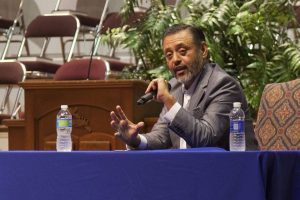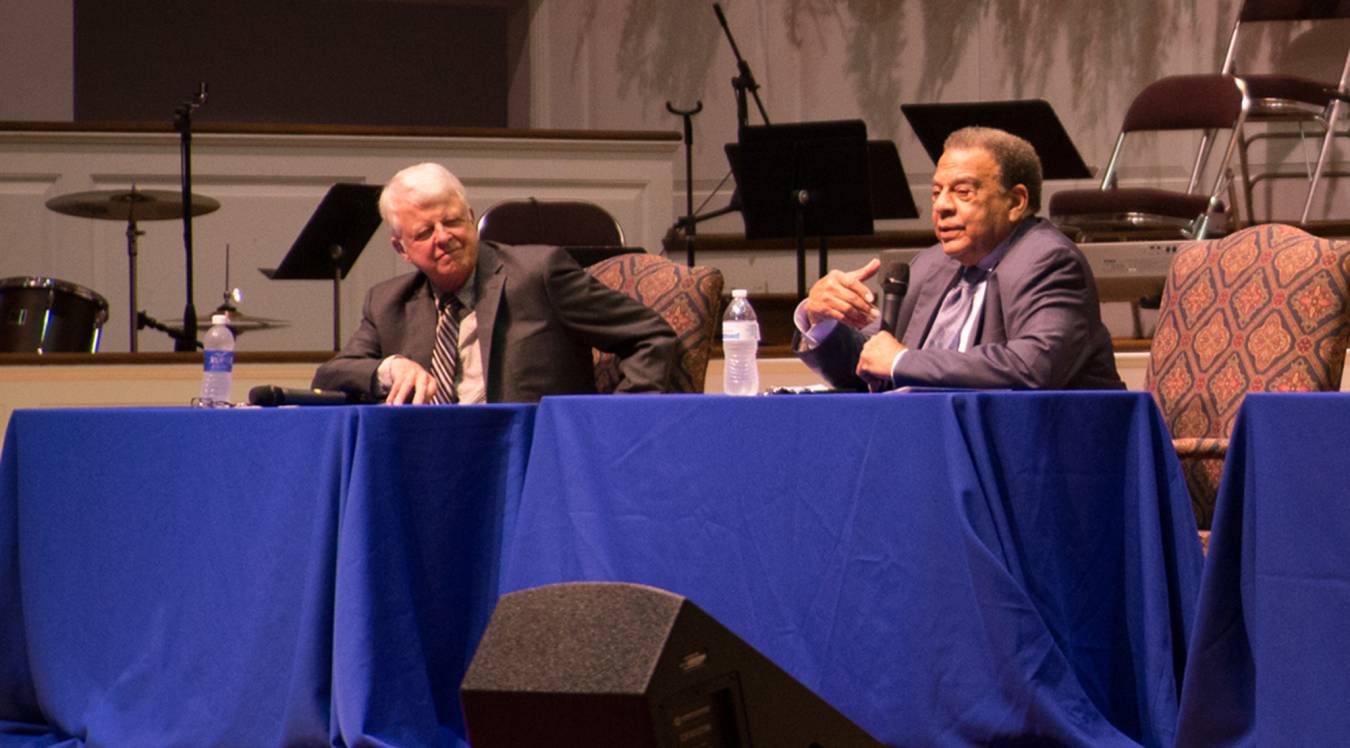By Gary D. Myers, NOBTS communications
NEW ORLEANS (BP) – Discussing race in America is complex, difficult, risky and necessary. New Orleans Baptist Theological Seminary joined the conversation with its “Talking about Race” conference Sept. 27.
Sponsored by the seminary’s Institute for Faith and the Public Square, the event brought together Andrew Young Jr., Noel Castellanos and Raymond Bakke — three men who have given their lives and careers to some of the most vulnerable people in American society.
Young, a civil rights icon, served as a pastor, mayor, congressman and U.S. ambassador to the United Nations. Castellanos, chief executive officer of the Christian Community Development Association, has ministered to urban Latinos since 1982. Bakke, a pastor and urban ministry professor, is founder and executive director of International Urban Associates, an organization dedicated to taking the Gospel to the urban centers of the world.
The men set a hopeful tone from the start sharing stories from their own experiences, encouraging grassroots change, one person at a time. The solution, in their view, comes when people of different backgrounds and ethnicities live out life together. Ultimately, each speaker placed their hope for lasting reconciliation in Christ.
“It was an exciting and thought-provoking event,” said Lloyd Harsch, NOBTS professor and director of the Institute for Faith and the Public Square. “The speakers addressed reconciliation out of their own personal experience in light of biblical teaching.
“Reconciliation is not an academic goal. It becomes a reality on the personal level as each person listens to the story of the other person and begins to intentionally live Martin Luther King Jr.’s dream of treating each other by the content of our character, not the color of our skin,” Harsch said.
Young: ‘Amazing Grace’ from ‘the power of the Lord’
Andrew Young opened the conference by weaving together stories from his childhood, ministry and political career. The common thread was his call for a calm, patient approach. For him, high emotion is an enemy to reconciliation.
Young said he first learned to control his emotions in the face of racism as a young boy in New Orleans. At the time, he lived across the street from the American Nazi Party’s New Orleans headquarters.
“My father said, ‘Look, you have to realize that white supremacy is a sickness and you can’t get angry with sick people. If you react emotionally, you can catch the sickness,'” Young recalled.
Later, as Young and his father watched newsreels of Jesse Owens’ record-gold medal performances in the 1936 Olympics, they took note of his actions when he was snubbed by German leaders. Instead of lashing out, Owens focused on his task and set three world records.
Emotion and fighting, Young said, will not make a difference. Instead he encouraged dialogue with people who are different in order to gain mutual understanding. Young carried this philosophy with him during the civil rights movement even as some grew tired of Martin Luther King Jr.’s non-violent approach. In his view, King’s steady, loving approach brought great progress for black people in America.
More progress will not be easy, Young said, because the sin of looking down on people who are different remains prevalent today.
“There is something in humanity that makes us sin and fall short of the glory of God,” Young said. “There is something in humanity that makes us insecure until we find ourselves in Christ.”
Later, Young reminded the audience of the history behind the hymn “Amazing Grace.” The song was written by a former slave trader, John Newton, whose life was changed when he found Jesus, Young said.
“If it can happen to a slave trader, how much more can we do with the power of the Lord, the love of each other and taking advantage of the technological and scientific advantages of our time,” Young said.
Castellanos: a long journey to progress
Noel Castellanos compared the struggle for racial reconciliation to an arduous 500-mile camino (journey) he took through the mountains of northern Spain several years ago. The Camino de Santiago spanned 31 days as he climbed mountain after mountain.
Each mountain brought new discouragement, Castellanos said, but he put his head down and simply put one foot in front of the other until he made it to the top. Again and again he faced yet another mountain.
People are experiencing a similar type of discouragement in the current racial situation in the America, Castellanos said.
“We have gone through so much pain and so much hurt to get to where we are and we look around the bend and, wow, now there’s another mountain we have to climb,” he said. “The camino of life is hard, the path of life on this side of eternity is going to be difficult.”
Though he was born a U.S. citizen to parents who were citizens in Texas, Castellanos was closely connected to Mexico. Spanish was spoken in his home and his parents labored as migrant workers until he was 7. Unfortunately, Castellanos said, he has experienced the bitter sting of racism firsthand.
“I could be paralyzed by that pain,” he said, however: “The pain has prepared me to do ministry in the context that God has called me to do — in very vulnerable immigrant neighborhoods in our country.
“The way you make an impact for the Kingdom is you do it the way Jesus did,” Castellanos said. “You enter into the pain of the reality that people live in every day and you live in solidarity with them.”
In living among the hurting, Castellanos said one learns not only their pain, but their aspirations and dreams. Living life in community with the hurting allows the believer to offer encouragement and help in building a community in a God-honoring way, he said.
In Chicago, Castellanos joined a primarily African-American church to better understand the struggles of his black brothers and sisters in Christ. Since then a diverse group of people has joined the church. With the changes, the congregation stopped identifying itself as a “black church” but rather as a church located in the black and Latino community.
Castellanos said this change in thinking opened the congregation to anyone willing to enter in. It is in this openness to work together, worship together and live in community with people of different backgrounds that lasting progress happens, he said.

Noel Castellanos, chief executive office of the Christian Community Development Association, discusses incarnational, cross-cultural living during the “Talking about Race” conference at New Orleans Seminary.
Photo by Gary D. Myers
Bakke: Colossians, Philippians or both
“Nations are now in the neighborhoods,” Bakke said, noting that one New York neighborhood is home to people from 133 different nations.
God is bringing the nations to the urban centers of the world, which is making it easier for the church to participate in God’s Great Commission, Bakke said.
“It is the greatest bargain in world missions,” he said. “[Missions] is no longer across the world, it is across the street in almost every one of our cities. Thank God. I think it is the Lord’s agenda.”
Bakke said he often divides audiences into two groups. He assigns one group the book of Colossians and asks them to pretend it is the only scripture they have. The other half is assigned Philippians with the same guideline. Bakke then gives the groups time to study and develop a ministry for their city based only on their assigned books. To guide the process, Bakke asks them to pay close attention to how Jesus is presented in each case.
When the Colossians group reports back, they see Jesus “high and lifted up” at the right hand of God in the book, Bakke said. They want to clean up their city — removing toxic dumps, taking on corrupt banks and working to fix public schools. The group assigned Philippians finds Jesus living in the hearts of believers, Bakke said. They want to do prayerwalks, church planting and evangelistic crusades.
In America, these two visions of Christ were separated during the fundamentalist-modernist controversy, Bakke said. The modernists took the “public Christ” while evangelicals focused on the “personal Jesus,” he said, pointing out that both books share an understanding of Christ that is needed today.
Setting forth a unique interpretation of the books of Esther, Nehemiah and Ezra written during the time of the Persian Empire, Bakke noted that in Esther when the Jews faced persecution, Esther and her uncle Mordechai worked to change laws.
“The book does not mention the name of God,” Bakke said. “I think that is a deliberate strategy of the author telling us that when sin is written into the law, you can’t repent of it, you have to access power and change law.”
Esther’s actions made it possible for Nehemiah to begin rebuilding Jerusalem, Bakke continued. He compared Nehemiah to a community organizer who worked with local people to accomplish his task. People in the surrounding communities cast lots to see who would live in the rebuilt city. Ten percent moved inside the walls.
“What about tithing your congregation to move into bad neighborhoods?” Bakke asked. “That’s happened in Fresno. Twenty-seven families moved into the worst neighborhood called Lowell and have transformed it — not running any programs, just being neighbors. The crime went down. The mayor and the chief of police are believers in Jesus. It’s a miracle.”
Because of Esther and Nehemiah, Bakke said Ezra then was able to go back and rebuild the temple. It took a team of people to address the problems created by the exile and, likewise, Bakke believes teams of committed people are needed to address urban problems today.
Ongoing discussion
Some in the audience took exception to Young’s belief that the current problems surrounding race in America are more related to economics than racism. They instead see systemic racism at the root of many of the recent cases involving racial injustice.
Meanwhile, DeAron Washington, a master’s degree student in the NOBTS counseling program, said he was disappointed that none of the speakers offered a definition of racism or racial reconciliation, and none addressed whether racism is individual, systemic or both. The speakers also failed to address the recent high-profile police shootings involving African-Americans, he said. However, Washington saw the event as a positive step that could spark additional conversation and, by the morning after the event, had already been in contact with other NOBTS students, professors and staff members who were interested in continuing the dialogue.
For more about New Orleans Seminary’s Institute for Faith and the Public Square, visit faith-publicsquare.org.




